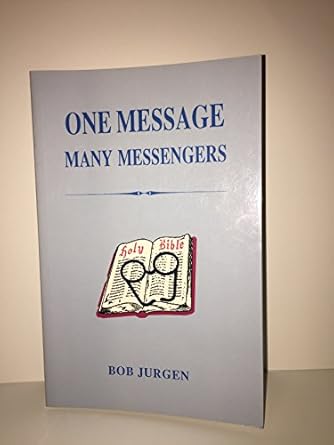In the rich tapestry of religious thought, the Bahá’í Faith stands out for its unifying perspective on spirituality and its distinctive approach to the concept of divine revelation. At the heart of this philosophy lies the profound tenet of “One Message, Many Messengers,” encapsulating the idea that all major world religions stem from a singular divine source. Consequently, this principle not only fosters an intrinsic kinship among disparate faiths but also stimulates a deeper inquiry into the nature of truth and revelation itself.
To grasp the essence of Bahá’í teachings regarding divine revelation, it is imperative to first explore the concept of God as a singular, ineffable entity. Within the Bahá’í worldview, God is considered transcendent, unreachable by human comprehension yet intimately involved in the lives of His creation. This dichotomy necessitates a medium through which divine messages can permeate human understanding—this role is filled by the Manifestations of God, who serve as the articulated Messengers of the divine Word.
According to Bahá’í teachings, these Manifestations—figures such as Jesus Christ, Muhammad, Moses, and Baha’u’llah—do not represent disparate deities, but rather act as successive mirrors reflecting the same spiritual truths. Each Messenger, while offering distinct teachings tailored to the historical and cultural milieu of their time, fundamentally points toward the same abstract realities, essence of human purpose, and divine attributes. This perspective engenders a formidable sense of unity, reinforcing the Bahá’í assertion that spiritual progression is a continuum rather than a series of disjointed revelations.
Nonetheless, the concept of “One Message, Many Messengers” invites scrutiny beyond mere theological alignment. It challenges adherents of various faith traditions to reconcile their understanding of new revelations with established beliefs. The Bahá’í Faith, indeed, posits that each Messenger has come with specific capacities to address the evolving needs of humanity. As societal norms shift and new moral dilemmas arise, the divine message adapts and reveals facets of truth necessary for contemporary understanding. Thus, as Baha’u’llah stated, “The earth is but one country, and mankind its citizens,” emphasizing the importance of collective unity amidst diversity.
This doctrine also includes the recognition of the historical context in which each Messenger operated. For example, while Jesus espoused the principle of love and compassion within a Roman-influenced framework, Baha’u’llah addressed the complexities of an industrializing world grappling with issues of justice and equity. This acknowledgment does not confine each Messenger to their temporal situations, but rather, illustrates the manner in which eternal ideals manifest differently as humanity progresses through epochs of development.
Exploring the implications of this teaching invites a deeper contemplation of the nature of truth. Truth, when perceived through the Bahá’í lens, is not monolithic but rather a mosaic reflecting varied dimensions and interpretations. This paradigm encourages believers to approach divergent voices not as threats to their faith but as opportunities for enrichment and expansion of understanding. Such an attitude not only dismantles barriers of sectarianism but also nurtures an ethos of inclusivity and dialogue essential for collective spiritual maturation.
Core to conveying this inter-religious harmony is the recognition of the common foundations shared by various faiths. The Bahá’í principle emphasizes that ethical and spiritual principles espoused across traditions—such as love, justice, and fidelity to truth—remain interrelated. This commonality transcends dogmas and rituals, steering believers toward the shared moral imperatives pivotal for fostering global peace and cooperation.
However, the Bahá’í teachings also underscore the necessity of personal investigation into truth. While the Manifestations provide the framework of divine guidance, individual inquiry is indispensable in actualizing the wisdom offered. This aligns with the exhortation to think independently and critically, thereby forging a path toward personal enlightenment. Such intellectual rigor serves not as a rejection of faith but as a complement to the overall understanding of divine intentions.
Furthermore, the exploration of “One Message, Many Messengers” introduces the concept of progressive revelation, suggesting that religious truth evolves over time. This philosophy lends itself to a refreshing dynamic where contemporary, relevant interpretations of scripture can coexist alongside traditional beliefs. The evolution of thought does not negate past revelations; it enriches them, inviting humanity toward a collaborative discovery of essential universal truths.
In sum, the teaching of “One Message, Many Messengers” serves as a luminous thread weaving through the fabric of the Bahá’í Faith. By embracing this principle, followers are encouraged to cultivate an atmosphere that cherishes connection over division. The recognition that all religions stem from a singular divine source not only transforms inter-religious dialogue but also fosters an appreciation of the diverse expressions of human spirituality. As individuals delve deeper into the meaning of this profound teaching, they are urged to engage in an ever-expanding quest for knowledge, compassion, and unity, thereby fulfilling the divine imperative to recognize the essential oneness of humanity.
